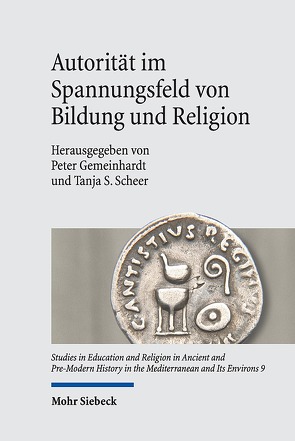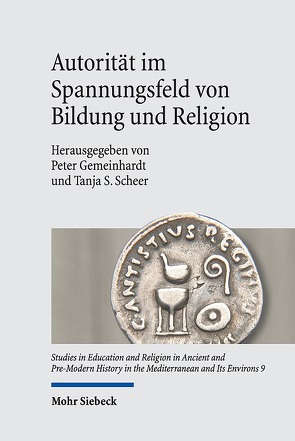Autorität und Autoritäten spielen für Bildung und Religion eine wichtige Rolle - besonders wenn zwischen beiden eine Spannung, ja Konkurrenz besteht. In Kulturen des Mittelmeerraums und seiner Umwelt wird dieses Verhältnis unter verschiedenen Vorzeichen thematisch: Autoritätskonstruktionen tragen zur Durchsetzung von Wahrheitsansprüchen und zur Speicherung, Tradierung und Vermittlung von religiösem und Bildungswissen bei. Dabei kommen unterschiedliche Medien - Texte, Riten, Traditionen - ins Spiel. Spannungsverhältnisse zwischen Bildung und Religion schlagen sich in Leitdiskursen nieder, die wiederum Aufschlüsse über die innere Dynamik vormoderner Gesellschaften erlauben. Die Leitfrage dieses Bandes lautet entsprechend: Wie verhalten sich Prozesse der Zuschreibung, Fixierung und Usurpation von Autorität im Spannungsfeld von Bildung und Religion in antiken und mittelalterlichen Kulturen?
Aktualisiert: 2022-12-22
> findR *
Autorität und Autoritäten spielen für Bildung und Religion eine wichtige Rolle - besonders wenn zwischen beiden eine Spannung, ja Konkurrenz besteht. In Kulturen des Mittelmeerraums und seiner Umwelt wird dieses Verhältnis unter verschiedenen Vorzeichen thematisch: Autoritätskonstruktionen tragen zur Durchsetzung von Wahrheitsansprüchen und zur Speicherung, Tradierung und Vermittlung von religiösem und Bildungswissen bei. Dabei kommen unterschiedliche Medien - Texte, Riten, Traditionen - ins Spiel. Spannungsverhältnisse zwischen Bildung und Religion schlagen sich in Leitdiskursen nieder, die wiederum Aufschlüsse über die innere Dynamik vormoderner Gesellschaften erlauben. Die Leitfrage dieses Bandes lautet entsprechend: Wie verhalten sich Prozesse der Zuschreibung, Fixierung und Usurpation von Autorität im Spannungsfeld von Bildung und Religion in antiken und mittelalterlichen Kulturen?
Aktualisiert: 2022-12-22
> findR *
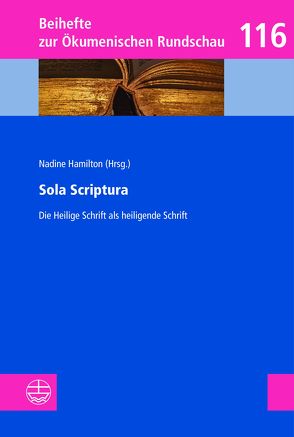
In 14 Beiträgen zum Thema Heilige Schrift und (ihre) Heiligkeit bietet dieser Tagungsband einen Einblick in das komplexe Feld theologischer Hermeneutik und der zugehörigen Frage nach der Heiligkeit der Schrift aus evangelischer, römisch-katholischer, orthodoxer sowie jüdischer und islamischer Perspektive. Damit will dieses Gespräch dazu beitragen, einen reflektierten Umgang mit Heiligkeit und heiligen Texten sowohl innerchristlich als auch interreligiös zu etablieren. Gerade dann nämlich, wenn heilige Texte nicht der Profanisierung anheimgegeben werden, aber auch nicht allein innerhalb einer sakralisierten Wirklichkeit ihre Entfaltung finden, kann zum einen die Heiligkeit dieser Texte gewahrt werden und können sie zum anderen als relevant für unserer Gesellschaft verstanden werden.
[Sola Scriptura. Holy Scripture as Medium of Holiness]
In 14 contributions to the theme of Holy Scripture and (its) holiness, this book provides insight into the complex field of theological hermeneutics and the related question of the holiness of Scripture from Protestant, Roman Catholic, Orthodox, Jewish and Islamic perspectives.
The discussion in this book helps to establish a reasoned and reflective approach to holiness and sacred texts, both within Christianity as well as interreligiously. It is precisely when sacred texts are not simply viewed from a secular standpoint, on the one hand, or completely within a separate sacralised reality on the other, that the holiness of these texts can be preserved and these texts can be understood as relevant for society.
Aktualisiert: 2022-04-01
> findR *
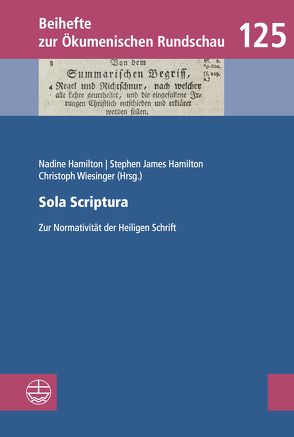
In zehn Beiträgen zur Frage nach der Normativität der Heiligen Schrift untersucht dieser Tagungsband Normierungsprozesse, die Geschriebenes und Überliefertes zu Verbindlichkeit und Normativität führen. Dazu werden historische und politische Bedingungen reflektiert, die normative Diskursformationen entstehen lassen. Offenkundig ist dabei, dass es um eine lebendige Praxis geht, die noch heute darum ringt, in welchem Sinn der Kanon als „einige Regel und Richtschnur“ (Epit.I) zu gelten hat. Damit will dieses Gespräch dazu beitragen, nicht von einem Schriftprinzip als vielmehr von einem Streitprinzip zu sprechen, wenn es die Heilige Schrift als normative Richtschnur durch Erfahrung je neu auf die Probe gestellt sieht. So wird die Normativitätsfrage in unterschiedlichen Perspektiven beleuchtet, wodurch sich zuletzt juristische, historische, systematisch- und praktisch-theologische sowie exegetische Perspektiven auf ein streitbares Thema verschränken.
Mit Beiträgen von Gerhard Dannecker, Henning Hupe, Nadine Hamilton, Stephen James Hamilton, Gerhard Marcel Martin, Ingrid Schoberth, Wolfgang Schoberth, Yan Suarsana, Christoph Wiesinger und Josef Wohlmuth.
[Sola Scriptura. On the Normativity of Sacred Scripture]
The contributions in this volume examine the question of Scripture’s normativity, particularly the processes which make written and traditional texts binding in light of the historical and political conditions which give rise to normativity. This task entails thinking about a living practice which still struggles today to articulate exactly how the biblical canon is to be considered »the sole rule and guideline«. The contributions aim to shift the discussion away from a »scriptural principle« and towards a »principle of dispute« instead, which views Scripture as a normative guideline continually put to the test by experience. This volume therefore examines questions of normativity from multiple perspectives: legal, historical, systematic, practical-theological as well as exegetical.
Aktualisiert: 2020-11-03
> findR *
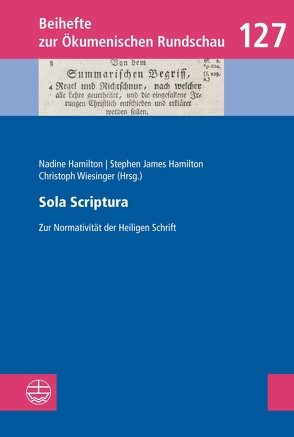
In zehn Beiträgen zur Frage nach der Normativität der Heiligen Schrift untersucht dieser Tagungsband Normierungsprozesse, die Geschriebenes und Überliefertes zu Verbindlichkeit und Normativität führen. Dazu werden historische und politische Bedingungen reflektiert, die normative Diskursformationen entstehen lassen. Offenkundig ist dabei, dass es um eine lebendige Praxis geht, die noch heute darum ringt, in welchem Sinn der Kanon als „einige Regel und Richtschnur“ (Epit.I) zu gelten hat. Damit will dieses Gespräch dazu beitragen, nicht von einem Schriftprinzip als vielmehr von einem Streitprinzip zu sprechen, wenn es die Heilige Schrift als normative Richtschnur durch Erfahrung je neu auf die Probe gestellt sieht. So wird die Normativitätsfrage in unterschiedlichen Perspektiven beleuchtet, wodurch sich zuletzt juristische, historische, systematisch- und praktisch-theologische sowie exegetische Perspektiven auf ein streitbares Thema verschränken.
Mit Beiträgen von Gerhard Dannecker, Henning Hupe, Nadine Hamilton, Stephen James Hamilton, Gerhard Marcel Martin, Ingrid Schoberth, Wolfgang Schoberth, Yan Suarsana, Christoph Wiesinger und Josef Wohlmuth.
[Sola Scriptura. On the Normativity of Sacred Scripture]
The contributions in this volume examine the question of Scripture’s normativity, particularly the processes which make written and traditional texts binding in light of the historical and political conditions which give rise to normativity. This task entails thinking about a living practice which still struggles today to articulate exactly how the biblical canon is to be considered »the sole rule and guideline«. The contributions aim to shift the discussion away from a »scriptural principle« and towards a »principle of dispute« instead, which views Scripture as a normative guideline continually put to the test by experience. This volume therefore examines questions of normativity from multiple perspectives: legal, historical, systematic, practical-theological as well as exegetical.
Aktualisiert: 2020-11-03
> findR *
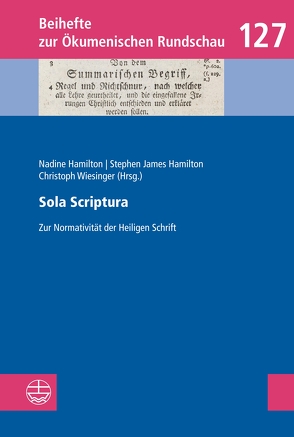
In zehn Beiträgen zur Frage nach der Normativität der Heiligen Schrift untersucht dieser Tagungsband Normierungsprozesse, die Geschriebenes und Überliefertes zu Verbindlichkeit und Normativität führen. Dazu werden historische und politische Bedingungen reflektiert, die normative Diskursformationen entstehen lassen. Offenkundig ist dabei, dass es um eine lebendige Praxis geht, die noch heute darum ringt, in welchem Sinn der Kanon als „einige Regel und Richtschnur“ (Epit.I) zu gelten hat. Damit will dieses Gespräch dazu beitragen, nicht von einem Schriftprinzip als vielmehr von einem Streitprinzip zu sprechen, wenn es die Heilige Schrift als normative Richtschnur durch Erfahrung je neu auf die Probe gestellt sieht. So wird die Normativitätsfrage in unterschiedlichen Perspektiven beleuchtet, wodurch sich zuletzt juristische, historische, systematisch- und praktisch-theologische sowie exegetische Perspektiven auf ein streitbares Thema verschränken.
Mit Beiträgen von Gerhard Dannecker, Henning Hupe, Nadine Hamilton, Stephen James Hamilton, Gerhard Marcel Martin, Ingrid Schoberth, Wolfgang Schoberth, Yan Suarsana, Christoph Wiesinger und Josef Wohlmuth.
[Sola Scriptura. On the Normativity of Sacred Scripture]
The contributions in this volume examine the question of Scripture’s normativity, particularly the processes which make written and traditional texts binding in light of the historical and political conditions which give rise to normativity. This task entails thinking about a living practice which still struggles today to articulate exactly how the biblical canon is to be considered »the sole rule and guideline«. The contributions aim to shift the discussion away from a »scriptural principle« and towards a »principle of dispute« instead, which views Scripture as a normative guideline continually put to the test by experience. This volume therefore examines questions of normativity from multiple perspectives: legal, historical, systematic, practical-theological as well as exegetical.
Aktualisiert: 2020-11-03
> findR *
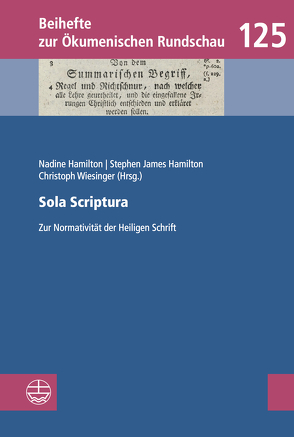
In zehn Beiträgen zur Frage nach der Normativität der Heiligen Schrift untersucht dieser Tagungsband Normierungsprozesse, die Geschriebenes und Überliefertes zu Verbindlichkeit und Normativität führen. Dazu werden historische und politische Bedingungen reflektiert, die normative Diskursformationen entstehen lassen. Offenkundig ist dabei, dass es um eine lebendige Praxis geht, die noch heute darum ringt, in welchem Sinn der Kanon als „einige Regel und Richtschnur“ (Epit.I) zu gelten hat. Damit will dieses Gespräch dazu beitragen, nicht von einem Schriftprinzip als vielmehr von einem Streitprinzip zu sprechen, wenn es die Heilige Schrift als normative Richtschnur durch Erfahrung je neu auf die Probe gestellt sieht. So wird die Normativitätsfrage in unterschiedlichen Perspektiven beleuchtet, wodurch sich zuletzt juristische, historische, systematisch- und praktisch-theologische sowie exegetische Perspektiven auf ein streitbares Thema verschränken.
Mit Beiträgen von Gerhard Dannecker, Henning Hupe, Nadine Hamilton, Stephen James Hamilton, Gerhard Marcel Martin, Ingrid Schoberth, Wolfgang Schoberth, Yan Suarsana, Christoph Wiesinger und Josef Wohlmuth.
[Sola Scriptura. On the Normativity of Sacred Scripture]
The contributions in this volume examine the question of Scripture’s normativity, particularly the processes which make written and traditional texts binding in light of the historical and political conditions which give rise to normativity. This task entails thinking about a living practice which still struggles today to articulate exactly how the biblical canon is to be considered »the sole rule and guideline«. The contributions aim to shift the discussion away from a »scriptural principle« and towards a »principle of dispute« instead, which views Scripture as a normative guideline continually put to the test by experience. This volume therefore examines questions of normativity from multiple perspectives: legal, historical, systematic, practical-theological as well as exegetical.
Aktualisiert: 2022-04-01
> findR *
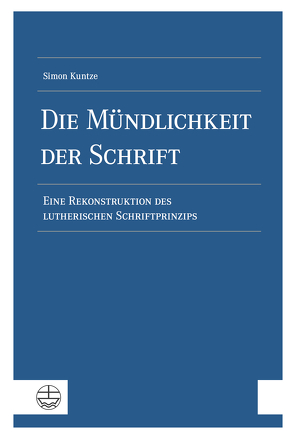
Sagt uns die Bibel, was wir schon wissen? Oder handelt sie von Geschichten, die uns nichts angehen? Die Bibel ist uns zugleich fremd und nahe — so die These der vorliegenden Arbeit. Die Metaphorik von Schriftlichkeit und Mündlichkeit spielt bei Martin Luthers Begründung der Schriftautorität und bei der Darlegung der Autorität von Schrift und Tradition auf dem Trienter Konzil eine zentrale Rolle. Die lutherische Hervorhebung der ursprünglich »mündlichen« Qualität des Evangeliums, wie es durch die Schrift vermittelt wird, dient dazu, die Schrift als zugleich nahes und fremdes Wort Gottes zu reflektieren. Als mündliches Wort bleibt die Schrift Wort Gottes, dessen Autor seinen »Text« nicht aus seiner Deutungsvollmacht entlässt – also fremdes Wort. Als mündliches Wort spricht die Schrift aber auch konkret in unsere Situation, in der Gott sich als der Immanuel, der Gott mit uns, vorstellt.
Der Autor wurde mit der vorliegenden Arbeit im Jahr 2018 promoviert.
[The Orality of Scripture. Reconstructing the Lutheran Principle of Scripture]
Does the Bible tell us what we already know? Or is it a collection of ancient stories that are no concern to us? The Bible is strange but yet close, that is the thesis of this paper. The metaphor of both the written and the oral form played an important role for Martin Luther’s explanation of the authority of Scripture as well as for the presentation of the authority of »Scripture and Tradition« at the Trient Council. The Lutheran emphasis on the »oral« quality of the Gospel, as conveyed through the Bible, serves to reflect Scripture as both a close and external Word of God. As an oral word the Scripture is a Word of God, whose author does not release his »text« from his power of interpretation – and thus remains a foreign word. As an oral word, however, Scripture also speaks concretely into the present situation, in which God reveals himself as the Immanuel, the God with us.
Aktualisiert: 2022-04-01
> findR *
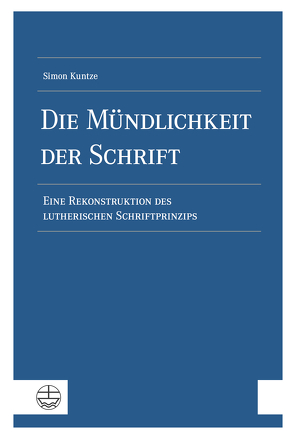
Sagt uns die Bibel, was wir schon wissen? Oder handelt sie von Geschichten, die uns nichts angehen? Die Bibel ist uns zugleich fremd und nahe — so die These der vorliegenden Arbeit. Die Metaphorik von Schriftlichkeit und Mündlichkeit spielt bei Martin Luthers Begründung der Schriftautorität und bei der Darlegung der Autorität von Schrift und Tradition auf dem Trienter Konzil eine zentrale Rolle. Die lutherische Hervorhebung der ursprünglich »mündlichen« Qualität des Evangeliums, wie es durch die Schrift vermittelt wird, dient dazu, die Schrift als zugleich nahes und fremdes Wort Gottes zu reflektieren. Als mündliches Wort bleibt die Schrift Wort Gottes, dessen Autor seinen »Text« nicht aus seiner Deutungsvollmacht entlässt – also fremdes Wort. Als mündliches Wort spricht die Schrift aber auch konkret in unsere Situation, in der Gott sich als der Immanuel, der Gott mit uns, vorstellt.
Der Autor wurde mit der vorliegenden Arbeit im Jahr 2018 promoviert.
[The Orality of Scripture. Reconstructing the Lutheran Principle of Scripture]
Does the Bible tell us what we already know? Or is it a collection of ancient stories that are no concern to us? The Bible is strange but yet close, that is the thesis of this paper. The metaphor of both the written and the oral form played an important role for Martin Luther’s explanation of the authority of Scripture as well as for the presentation of the authority of »Scripture and Tradition« at the Trient Council. The Lutheran emphasis on the »oral« quality of the Gospel, as conveyed through the Bible, serves to reflect Scripture as both a close and external Word of God. As an oral word the Scripture is a Word of God, whose author does not release his »text« from his power of interpretation – and thus remains a foreign word. As an oral word, however, Scripture also speaks concretely into the present situation, in which God reveals himself as the Immanuel, the God with us.
Aktualisiert: 2022-04-01
> findR *
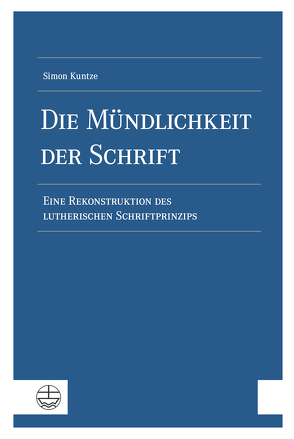
Sagt uns die Bibel, was wir schon wissen? Oder handelt sie von Geschichten, die uns nichts angehen? Die Bibel ist uns zugleich fremd und nahe — so die These der vorliegenden Arbeit. Die Metaphorik von Schriftlichkeit und Mündlichkeit spielt bei Martin Luthers Begründung der Schriftautorität und bei der Darlegung der Autorität von Schrift und Tradition auf dem Trienter Konzil eine zentrale Rolle. Die lutherische Hervorhebung der ursprünglich »mündlichen« Qualität des Evangeliums, wie es durch die Schrift vermittelt wird, dient dazu, die Schrift als zugleich nahes und fremdes Wort Gottes zu reflektieren. Als mündliches Wort bleibt die Schrift Wort Gottes, dessen Autor seinen »Text« nicht aus seiner Deutungsvollmacht entlässt – also fremdes Wort. Als mündliches Wort spricht die Schrift aber auch konkret in unsere Situation, in der Gott sich als der Immanuel, der Gott mit uns, vorstellt.
Der Autor wurde mit der vorliegenden Arbeit im Jahr 2018 promoviert.
[The Orality of Scripture. Reconstructing the Lutheran Principle of Scripture]
Does the Bible tell us what we already know? Or is it a collection of ancient stories that are no concern to us? The Bible is strange but yet close, that is the thesis of this paper. The metaphor of both the written and the oral form played an important role for Martin Luther’s explanation of the authority of Scripture as well as for the presentation of the authority of »Scripture and Tradition« at the Trient Council. The Lutheran emphasis on the »oral« quality of the Gospel, as conveyed through the Bible, serves to reflect Scripture as both a close and external Word of God. As an oral word the Scripture is a Word of God, whose author does not release his »text« from his power of interpretation – and thus remains a foreign word. As an oral word, however, Scripture also speaks concretely into the present situation, in which God reveals himself as the Immanuel, the God with us.
Aktualisiert: 2020-11-06
> findR *
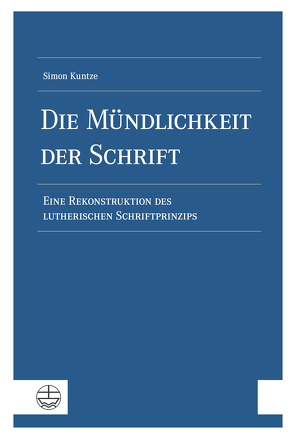
Sagt uns die Bibel, was wir schon wissen? Oder handelt sie von Geschichten, die uns nichts angehen? Die Bibel ist uns zugleich fremd und nahe — so die These der vorliegenden Arbeit. Die Metaphorik von Schriftlichkeit und Mündlichkeit spielt bei Martin Luthers Begründung der Schriftautorität und bei der Darlegung der Autorität von Schrift und Tradition auf dem Trienter Konzil eine zentrale Rolle. Die lutherische Hervorhebung der ursprünglich »mündlichen« Qualität des Evangeliums, wie es durch die Schrift vermittelt wird, dient dazu, die Schrift als zugleich nahes und fremdes Wort Gottes zu reflektieren. Als mündliches Wort bleibt die Schrift Wort Gottes, dessen Autor seinen »Text« nicht aus seiner Deutungsvollmacht entlässt – also fremdes Wort. Als mündliches Wort spricht die Schrift aber auch konkret in unsere Situation, in der Gott sich als der Immanuel, der Gott mit uns, vorstellt.
Der Autor wurde mit der vorliegenden Arbeit im Jahr 2018 promoviert.
[The Orality of Scripture. Reconstructing the Lutheran Principle of Scripture]
Does the Bible tell us what we already know? Or is it a collection of ancient stories that are no concern to us? The Bible is strange but yet close, that is the thesis of this paper. The metaphor of both the written and the oral form played an important role for Martin Luther’s explanation of the authority of Scripture as well as for the presentation of the authority of »Scripture and Tradition« at the Trient Council. The Lutheran emphasis on the »oral« quality of the Gospel, as conveyed through the Bible, serves to reflect Scripture as both a close and external Word of God. As an oral word the Scripture is a Word of God, whose author does not release his »text« from his power of interpretation – and thus remains a foreign word. As an oral word, however, Scripture also speaks concretely into the present situation, in which God reveals himself as the Immanuel, the God with us.
Aktualisiert: 2022-04-01
> findR *
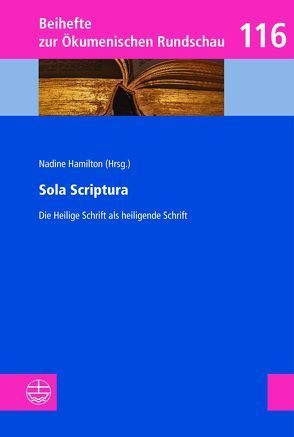
In 14 Beiträgen zum Thema Heilige Schrift und (ihre) Heiligkeit bietet dieser Tagungsband einen Einblick in das komplexe Feld theologischer Hermeneutik und der zugehörigen Frage nach der Heiligkeit der Schrift aus evangelischer, römisch-katholischer, orthodoxer sowie jüdischer und islamischer Perspektive. Damit will dieses Gespräch dazu beitragen, einen reflektierten Umgang mit Heiligkeit und heiligen Texten sowohl innerchristlich als auch interreligiös zu etablieren. Gerade dann nämlich, wenn heilige Texte nicht der Profanisierung anheimgegeben werden, aber auch nicht allein innerhalb einer sakralisierten Wirklichkeit ihre Entfaltung finden, kann zum einen die Heiligkeit dieser Texte gewahrt werden und können sie zum anderen als relevant für unserer Gesellschaft verstanden werden.
[Sola Scriptura. Holy Scripture as Medium of Holiness]
In 14 contributions to the theme of Holy Scripture and (its) holiness, this book provides insight into the complex field of theological hermeneutics and the related question of the holiness of Scripture from Protestant, Roman Catholic, Orthodox, Jewish and Islamic perspectives.
The discussion in this book helps to establish a reasoned and reflective approach to holiness and sacred texts, both within Christianity as well as interreligiously. It is precisely when sacred texts are not simply viewed from a secular standpoint, on the one hand, or completely within a separate sacralised reality on the other, that the holiness of these texts can be preserved and these texts can be understood as relevant for society.
Aktualisiert: 2021-09-15
> findR *
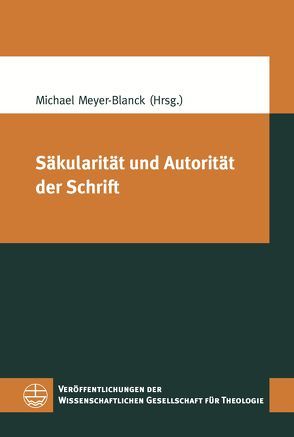
Die Bibel Alten und Neuen Testaments ist die Grundurkunde der Kirche und der integrierende Bezugspunkt aller christlichen Theologie. Für die reformatorisch bestimmte Theologie gilt das in besonderem Maße. Die exegetischen Disziplinen haben die Vielfalt der Überlieferungen zu erhellen und fruchtbar zu machen, während die systematische und praktische Disziplin die Bedingungen für die Geltung von biblischen Aussagen als „Heilige Schrift“ skizzieren. Dabei gibt es eine Entwicklung von der reformatorischen Berufung auf die Bibel als Autorität für Glauben und Lehre zum neuzeitlichen Wahrheitsbewusstsein, das die Geltung der Schrift von der Evidenz für Subjekte und Gemeinschaften her erschließt. Die Kirchengeschichte rekonstruiert diese historischen Veränderungen selbst, indem sie die Genese von Theologie auf dem Hintergrund der Auslegung der Bibel beschreibt.
Die evangelische Theologie muss heute beschreiben können, wie glaubende Autorität entstehen kann. Wie stellt sich die Autorität der Schrift in post-autoritärer Zeit und Gesellschaft dar? Inwiefern unterscheiden, inwiefern ähneln sich post-autoritäre Denkweisen in Westeuropa und Osteuropa?
Mit Beiträgen von David Benke, Christian Danz, Wilfried Engemann, Elisabeth Gräb-Schmidt, Friedhelm Hartenstein, Wolfram Kinzig, Johannes Klein, András Korányi, Imre Peres, Martin Prudky, Jan Roskovec und Hans Weder
Aktualisiert: 2022-04-01
> findR *
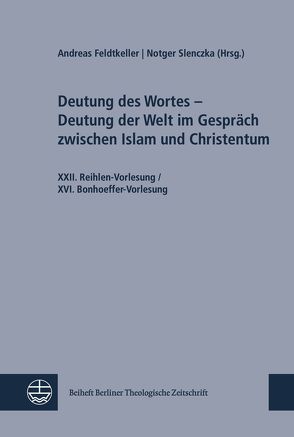
Religionen deuten Heilige Schriften, und Religionen deuten Wirklichkeit. In der Moderne haben sich die jeweiligen zeitgenössischen Gesellschaften zunehmend einer einheitlich-normativen religiösen Weltsicht entzogen und in der Perspektive historischer Arbeit stellt sich die Frage nach der göttlichen Verbindlichkeit Heiliger Schriften nicht. Wie integrieren das Christentum und der Islam den historischen Umgang mit den jeweiligen Heiligen Schriften? Wie gehen sie mit dem Phänomen des weltanschaulichen Pluralismus um? Wie deuten sie die Tradition individueller Menschen- und Freiheitsrechte?
Islamwissenschaftler, Philosophen und Theologen aus christlicher und islamischer Tradition treten ein in ein Gespräch über das Selbstverständnis der Religion in der Moderne.
[Interpretation of the Word – Interpretation of the World in the Dialogue Between Islam and Christianity]
In modern societies the religious interpretation of holy scriptures and the religious interpretation of the world and of society are confronted with specific challenges raised by the historical interpretation of holy texts, as well as by the plethora of religious and secular world-views and by the claims of human rights and individual liberty. In this collection of papers, presented at a colloquium in Berlin in 2014, scholars of Islamic studies, philosophers and theologians from Christian and Islamic traditions engage in a debate on the self-understanding of religion in Modernity.
Aktualisiert: 2020-07-06
> findR *
MEHR ANZEIGEN
Bücher zum Thema Schriftautorität
Sie suchen ein Buch über Schriftautorität? Bei Buch findr finden Sie eine große Auswahl Bücher zum
Thema Schriftautorität. Entdecken Sie neue Bücher oder Klassiker für Sie selbst oder zum Verschenken. Buch findr
hat zahlreiche Bücher zum Thema Schriftautorität im Sortiment. Nehmen Sie sich Zeit zum Stöbern und finden Sie das
passende Buch für Ihr Lesevergnügen. Stöbern Sie durch unser Angebot und finden Sie aus unserer großen Auswahl das
Buch, das Ihnen zusagt. Bei Buch findr finden Sie Romane, Ratgeber, wissenschaftliche und populärwissenschaftliche
Bücher uvm. Bestellen Sie Ihr Buch zum Thema Schriftautorität einfach online und lassen Sie es sich bequem nach
Hause schicken. Wir wünschen Ihnen schöne und entspannte Lesemomente mit Ihrem Buch.
Schriftautorität - Große Auswahl Bücher bei Buch findr
Bei uns finden Sie Bücher beliebter Autoren, Neuerscheinungen, Bestseller genauso wie alte Schätze. Bücher zum
Thema Schriftautorität, die Ihre Fantasie anregen und Bücher, die Sie weiterbilden und Ihnen wissenschaftliche
Fakten vermitteln. Ganz nach Ihrem Geschmack ist das passende Buch für Sie dabei. Finden Sie eine große Auswahl
Bücher verschiedenster Genres, Verlage, Autoren bei Buchfindr:
Sie haben viele Möglichkeiten bei Buch findr die passenden Bücher für Ihr Lesevergnügen zu entdecken. Nutzen Sie
unsere Suchfunktionen, um zu stöbern und für Sie interessante Bücher in den unterschiedlichen Genres und Kategorien
zu finden. Unter Schriftautorität und weitere Themen und Kategorien finden Sie schnell und einfach eine Auflistung
thematisch passender Bücher. Probieren Sie es aus, legen Sie jetzt los! Ihrem Lesevergnügen steht nichts im Wege.
Nutzen Sie die Vorteile Ihre Bücher online zu kaufen und bekommen Sie die bestellten Bücher schnell und bequem
zugestellt. Nehmen Sie sich die Zeit, online die Bücher Ihrer Wahl anzulesen, Buchempfehlungen und Rezensionen zu
studieren, Informationen zu Autoren zu lesen. Viel Spaß beim Lesen wünscht Ihnen das Team von Buchfindr.
